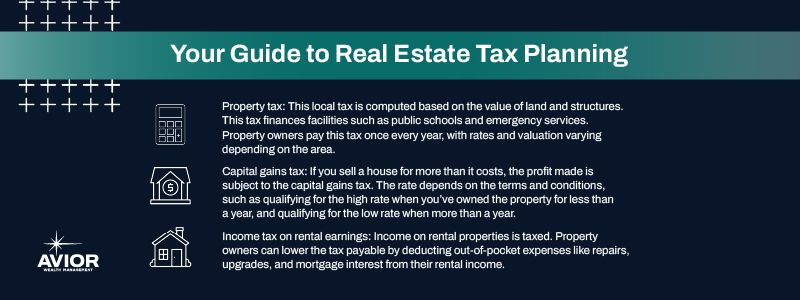Your Guide to Real Estate Tax Planning
Master the complexities of real estate taxation with this essential guide to navigating property taxes.
Every property owner or investor has to navigate property taxes in real estate, which is a demanding task. From taxes that fund local services to capital gains taxes on property sales, these obligations can significantly affect financial outcomes.
This guide examines the different kinds of real estate taxes and walks through how tax deductions and credits work, showing the necessity of professional tax planning so you can properly structure your investments.
Understanding real estate taxes
Real estate taxes come in several forms, each impacting property owners in different ways:

The importance of keeping up with tax laws
Real estate tax laws are always changing. Awareness can help you choose, invest in, or run your property wisely. For instance, new tax laws could bring better exemptions for property improvements or even affect the tax burden on investment gains.
Regularly checking in with tax professionals and following real estate tax news will help you stay informed and use tax advantages to improve investment returns.
Key tax deductions for real estate investors
Learning about tax deductions is vital for saving money with real estate. Here are some essential deductions every investor should consider:
- Mortgage interest: You can deduct the interest payable on a mortgage loan used to buy, construct, or improve rental property, reducing your taxable income.
- Property depreciation: The wear and tear of real estate assets lower their value, and the IRS amortizes this perceived depreciation. Individually, residential buildings are depreciated within 27.5 years, and commercial properties over 39 years. This offsets the total taxable amount, allowing for additional income generation.
- Maintenance expenses: Expenses related to restoring or fixing a property can also be claimed as a deduction. This may include painting, plumbing, and roof repair. To qualify as deductible, these expenses must be necessary and directly related to rental activities.
Exploring real estate tax credits
Tax credits also help real estate investors lower their tax burden. Here are some common tax credits:
- Renewable energy credits: Investors who deploy renewable energy tools, such as solar panels and wind turbines, can benefit from the renewable energy tax credit. Credits for as much as 25% of the cost of solar installation can counterbalance the tax burden.
- Historic preservation credits: Owners of historical structures who carry out restoration and preservation projects may qualify for tax credits on those projects. These credits are a driving force for maintaining historical features and usually cover most remodeling expenditures.
Deductions and credits help investors lower their tax burden and boost their income. Talk to a tax professional when you’re unsure which tax breaks you qualify for.
Types of ownership structures for real estate investments
Ownership structure helps real estate investors navigate tax planning and liability protection. Here are the types of structures to know along with their tax implications:
- Individual ownership: In this setup, an individual has absolute power. Income and expenses related to the property are itemized on your personal tax return, and income is subject to your individual tax rate.
- Partnership: This type of structure is when two people or associated corporations have equal rights to the property. Unlike corporations, partnerships don’t come with a big tax burden, but partners may pay income taxes on their portion of the partnership via the pass-through income structure. Liabilities are shared among the parties.
- Limited liability company (LLC): An LLC further serves as an umbrella that shields owners’ personal belongings and assets from claims against the company. LLC members also enjoy pass-through taxation at an individual level, unlike a corporation.
- S Corporation: Similar to LLCs, S corporations offer liability protection with pass-through taxation. However, S corporations usually have a small base of shareholders. The benefit of instead forming a C corporation is the benefit of having extra liability protection and avoiding self-employment taxes, which can be significant.
Pros and cons of real estate ownership structures
Now, let’s briefly sum up the pros and cons for each of these ownership structures:
Individual ownership:
Pros: Simplicity in management and filing tax reports.
Cons: Lack of liability protection if any legal issues arise.
Partnership:
Pros: The company’s profit and loss are shared with all partners, and each partner contributes to the business.
Cons: Joint liability may jeopardize one partner if other partners face legal issues.
LLC:
Pros: Provides liability protection but still preserves pass-through taxation. Flexible in raising profits and offering new members.
Cons: Creating and operating is more arduous and expensive than a single ownership or partnership.
S Corporation:
Pros: Pass-through taxation benefits while getting liability protection.
Cons: Limitations on the amount and types of shareholders and more formalized operating practices.
Every real estate ownership structure has its own pros and cons. Avior helps you figure out which is best for you based on your individual circumstances, including risk tolerance, time horizon, and investment objectives. Our expertise will help in selecting the most favorable structure.
The importance of estate and succession planning for real estate investors
Don’t forget that estate and succession planning are musts for real estate investors looking to accumulate their capital and continue their legacies.
Estate and succession planning help you map out asset allocation and management so you know what will happen to your real estate business and properties once you’re gone. Focusing on these important steps now will help your family avoid conflicts later and avoid paying too much in estate taxes.
Consider these factors when planning how property will be passed to your heirs:
- Legal documentation: Keeping all title and investment certificates up-to-date can speed up the tax and probate processes later.
- Evaluating heirs’ interests: Find out if your heirs would be interested in and able to handle real estate duties. Such decisions can dictate whether the property will be sold or the shares liquidated, with sale proceeds held in a trust.
- Tax implications: Several property transfer processes have tax implications, including estate, inheritance, and capital gains taxes. Talk with a tax advisor about what your real estate decisions may mean for future tax obligations.
Consider tax-efficient estate planning strategies like using trusts to have more control over your assets, gifting assets to loved ones to avoid estate taxes, or establishing a family limited partnership.
Developing an exit strategy and making a succession plan is key for real estate investments. Planning now what will happen with your property ownership will minimize the likelihood of family disputes and secure the future for later generations.
Enhance financial stability through strategic real estate tax planning
Being strategic with real estate tax planning will ensure you’re making wise decisions that will lead to more profits and minimized taxes. Remember to keep up with the latest tax laws and how they impact you, as well as deductions and credits that will help you lower your tax burden.
Working with a tax expert can help you ensure you’re making wise investing decisions while setting up a better financial future.
Get in touch with the team at Avior today to talk about your investing goals and financial situation. We help you consider all tax obligations and related legislation to make the best investment decisions for you.
Disclaimer: Nothing contained herein should be construed as legal or tax advice. Avior and our Advisors will work with your attorney and/or tax professional to assist with your legal and tax strategies. Please consult your attorney or tax professional with specific legal and/or tax questions. Investment Management and Financial Planner are offered through Avior Wealth Management, LLC, an SEC-registered investment advisor. Past performance is not a guarantee of future results. Investments are subject to loss, including the loss of principal.
No Comments
Sorry, the comment form is closed at this time.



